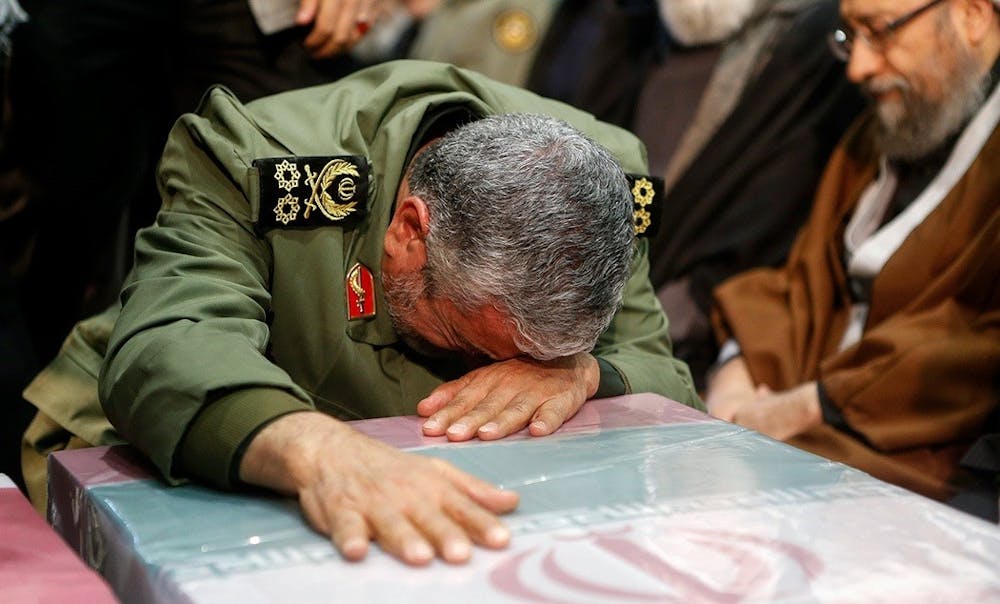
If Iran assassinated the head of the United States Department of Defense tomorrow, how would we respond? Probably not well.
Yet on Jan. 3, President Donald Trump ordered an equivalent action, killing Iranian general Qasem Soleimani in a drone strike. This was the most extreme military option to push back against Iranian aggression that U.S. generals presented to Trump, and they were taken aback by his decision.
Trump’s decision to kill Soleimani was senseless on many levels.
First, it was likely an illegal use of force. For use of force in the case of self-defense to be legal under international law, it must be in order to prevent a real and imminent threat.
But initially, the Department of Defense simply said the targeted killing was “aimed at deterring future Iranian attack plans.” There was nothing said about an imminent attack. Only after coming under scrutiny did the administration insist, and later back down from, claiming there was an imminent threat.
Weeks after the strikes, the administration has still yet to provide a shred of evidence. Some officials even admitted there was no imminent threat, and Senator Mike Lee (R-Utah) recently called out the Trump administration’s complete lack of explanation as “insulting and demeaning.”
Let's say there was a real threat. Then this surprising and destabilizing decision would make sense, right? Not really.
Even if we believe Soleimani was involved in a large plot to kill Americans, killing him likely couldn’t prevent an attack that was to occur in “days.” After all, Soleimani himself wasn’t going to attack the U.S. embassy in Iraq, guns blazing.
Republicans have also tried to justify the strikes by claiming they were punishment for the American troops killed in attacks planned by Soleimani during the Iraq War. Yes, Soleimani was a terrible individual who deserved what he got, but killing Soleimani has only put American troops at greater risk by moving the United States and Iran closer to war, dramatically destabilizing the region and doing enormous damage to United States-Iranian relations. Even weeks after Soleimani’s death, United States-Iran relations remain fraught with tension and the United States has destroyed its important relationship with Iraq.
Destabilization and tensions might sound like an abstract concept to some, but that wasn’t the case for the 176 people on a Ukrainian passenger plane accidentally shot down by Iranian surface to air missiles. It seems the Iranians were on high alert for an American counterattack after retaliating for Soleimani’s death with missile strikes on U.S. bases, and they mistook the jet for a cruise missile.
Trump’s actions directly set in motion a chain of events that created the fog of war, or misperceptions that occur during wartime, and, as a result, he shares responsibility for those who died. Accidents happen when tensions are high. We can't forget that the United States killed hundreds of innocent people when it accidentally downed an Iranian passenger plane in the late '80s.
The truth is that killing Soleimani didn’t make sense if the goal was to promote American interests and protect United States citizens.
Trump loves to show that he can do whatever he wants — whether it's his claim that he could walk down New York City's Fifth Avenue and shoot someone or his flagrant use of his office to persuade foreign countries to interfere in our elections. His decision to strike Soleimani was no different. He was simply following his usual motives: self-aggrandizement and self-interest.
And the only reason he gets away with this senselessness is because the Republican Party has completely abandoned any semblance of principles or integrity. From refusing to vote for a resolution condemning Trump’s racist demand for four congresswomen of color to “go back” to the “places from which they came” to defending the president’s leveraging of military aid and other political favors to help himself get re-elected, Republicans have almost completely capitulated to Trump’s ego.
Republicans and Congress are giving the President a green light to engage in whatever acts of “preemptive” war he wants. Last time, that brought us to the Iraq War, and this time it could be worse. That means our generation’s lives and paychecks are on the line.
Thankfully it’s 2020 and not 2003, and 2020 is an election year. We can help prevent WWIII and the degradation of the rule of law by getting rid of not only Trump, but also the Republican representatives that refuse to restrict his power. If the Senate won’t vote to remove Trump from office, then here in Pennsylvania, a critical swing state, we can remove Trump.
Everyone needs to vote in 2020. And we need to get involved with canvassing door-to-door, phone banking, and voter registration drives.
The new year began with Trump destabilizing the entire Middle East. Let’s make it end with a new president.
FRANCOIS BARRILLEAUX is a College sophomore studying Political Science and Economics. He is the Legislative Director for Penn Democrats. His email address is legislative@penndems.org.
The Daily Pennsylvanian is an independent, student-run newspaper. Please consider making a donation to support the coverage that shapes the University. Your generosity ensures a future of strong journalism at Penn.
Donate







